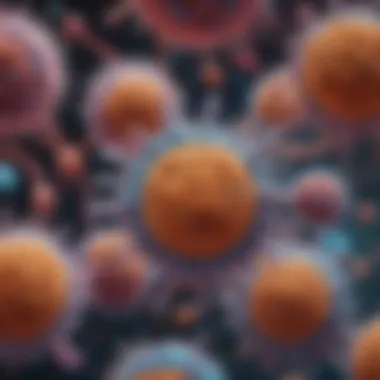Henrietta Lacks: Science, Ethics, and Humanity


Intro
The narrative of Henrietta Lacks serves as a bridge connecting science, ethics, and the very essence of humanity. Her life and legacy incite a profound discourse on the moral responsibilities that underscore scientific advancement. Lacks was an African American woman whose cells, taken without her consent in the early 1950s, became a cornerstone of numerous medical breakthroughs. This situation not only highlights the scientific potential of her cells, known as HeLa cells, but also raises critical questions regarding race, consent, and justice in medical research.
In exploring Henrietta's story, we wade through a complex landscape where the triumphs of science intertwine unsettlingly with the ethical ramifications of human experimentation. As we delve deeper, we encounter key concepts that shed light on various aspects of her life, the use of HeLa cells, and the implications of her legacy on contemporary society and future research practices.
Key Concepts and Insights
Main Ideas from the Book
Henrietta Lacks's cells presented unparalleled opportunities in medical research, allowing for advancements such as polio vaccines, cancer treatments, and the study of various diseases. However, the extraction of her cells was shrouded in a lack of informed consent, a standard practice that many were unaware of at the time.
- HeLa Cells: These cells were the first immortal human cell line, meaning they could divide indefinitely in a laboratory setting. Their unique properties have permitted scientists to conduct extensive research across multiple disciplines.
- Informed Consent: Henrietta's case exposes the murky waters surrounding the notion of consent in medical practices, particularly regarding marginalized communities.
- Racial Inequities: Her experience reveals systemic injustices present in the healthcare system, where African Americans were often subjected to unethical medical experimentation.
Practical Applications of Concepts
The implications of Henrietta Lacks's story echo in the ways we currently approach medical ethics and research consent. Many modern researchers are now more vigilant about obtaining informed consent and ensuring that participants are treated with respect.
- Ethical Oversight: Institutional Review Boards (IRBs) now oversee research involving human subjects to protect the rights and welfare of those involved.
- Community Engagement: Engaging communities in discussions about research participation helps build trust and transparency.
- Policy Changes: Movements for reform in medical ethics and regulations have gained momentum in light of stories like Henrietta's, pushing for more equitable treatment.
"Science, like any other human endeavor, can only advance as far as our ethics allow it to."
— Unknown
Recommendations and Further Reading
To gain a fuller understanding of this intricate narrative, consider exploring the following resources:
Related Books to Explore
- The Immortal Life of Henrietta Lacks by Rebecca Skloot – A deep dive into Henrietta's story, illustrating the intersection of her life with medical ethics.
- Henrietta Lacks: The Mother of Modern Medicine by Janice L. Lampley – An exploration of her impact in the context of modern medicine and ethical considerations.
Additional Resources for Personal Development
- Wikipedia - Henrietta Lacks
- Britannica - HeLa Cells
- Reddit - Discussions on Medical Ethics
- Facebook Groups for Ethical Research Engagement
Through this exploration of Henrietta Lacks's life and the ethical frameworks surrounding medical research, we not only honor her legacy but also take critical steps toward ensuring such injustices do not repeat themselves in the future.
Preamble to Henrietta Lacks
The tale of Henrietta Lacks is not just a chapter in medical history; it represents a profound intersection of science, ethics, and humanity that continues to resonate today. Understanding her story invites us to consider the ethical implications of scientific advancement and the human experiences that underpin these developments. This section sets the stage for exploring her life and legacy, weaving together the threads of her story with key ethical questions that arise from her contributions to science.
Historical Context
To fully grasp Henrietta Lacks' significance, one must step back into the early 20th century, a time marked by glaring disparities in healthcare access and racial inequalities. The Jim Crow laws cast a long shadow, creating an environment where African Americans faced systemic discrimination in various facets of life, including medical care. Hospitals were segregated, and research practices often overlooked the needs and rights of black patients.
In this era, innovations in medicine frequently proceeded without the consideration of ethical standards which protect the dignity and rights of individuals. Henrietta's life unfolded against this backdrop, highlighting the vulnerabilities faced by marginalized communities. This historical context is critical in recognizing her story not simply as a medical anecdote, but as a reflection of broader societal issues that still echo today.
Overview of Her Life
Henrietta Lacks was born on August 1, 1920, in Roanoke, Virginia. Growing up in a poor, rural family, her early life was marked by hardship. In her teens, she married David Lacks, and they would go on to have five children. Tragically, in 1951, Henrietta was diagnosed with cervical cancer. At the time, she sought treatment at John Hopkins Hospital, a rare venue where black patients were admitted and treated.
During her treatment, without her knowledge, doctors took samples of her cancerous cells. This act has spurred countless debates; Henrietta was never asked for consent, highlighting a fundamental ethical lapse in patient rights.
Those cells, which would come to be known as HeLa cells, were crucial in many groundbreaking medical advancements. Indeed, they proliferated rapidly in the lab, allowing for experiments that laid the groundwork for significant scientific milestones—ranging from the development of the polio vaccine to advancements in cancer research.
As we proceed through this exploration, it’s essential to remember that Henrietta was more than a donor of cells. She was a mother, a wife, and an individual with dreams and aspirations, caught in the tumult of both personal and societal challenges. Her story, laden with ethical dilemmas, forces us to confront uncomfortable truths about medical practices and the human cost of great scientific progress.
The Discovery of HeLa Cells


The story of HeLa cells is a cornerstone of modern medical research. Henrietta Lacks, an African-American woman, unknowingly contributed to science in a way that would change the landscape of medical studies. Her cells, taken without permission during cancer treatment, became the first immortal human cell line. This discovery is not just a testament to scientific achievement but also a mirror reflecting the ethical quandaries of medical research.
Medical Conditions Leading to Cell Donation
Understanding the journey of HeLa cells necessitates a look into Henrietta's medical condition. In January 1951, she visited Johns Hopkins Hospital for treatment of cervical cancer, a disease that would take her life just months later. In those days, medical practices were vastly different, and patients often were not afforded the same consideration for autonomy that we expect today.
While undergoing treatment, a doctor, George Gey, noticed the unique qualities of her cells. Unlike other cells, Henrietta’s cells did not die after a few hours in a lab setting. Instead, they multiplied at an astonishing rate. Gey obtained those cells without her knowledge or consent, a common practice of the time that now raises serious ethical concerns.
This incident has led to a broader dialogue about consent in the medical field, especially among marginalized populations. The lack of informed consent in Henrietta’s case has since become a focal point in discussions about ethics in medical research.
Initial Research and Breakthroughs
The impact of Henrietta Lacks’s cells extended well beyond her own tragedy. Once Gey cultured her cells, they became known as HeLa cells and quickly gained recognition for their unique longevity and robustness. From contributing to the development of the polio vaccine to being used in cancer and HIV research, the breakthroughs derived from HeLa cells are staggering.
For instance, in 1954, HeLa cells played a pivotal role in testing the first polio vaccine. Before the widespread vaccination efforts, polio was a devastating disease. The efficacy of the vaccine was tested using these immortal cells, leading to its eventual acceptance and implementation, saving countless lives.
Moreover, HeLa cells provided a foundation for the field of virology, enabling scientists to better understand how viruses operate. Researchers learned how viruses could infect and replicate in human cells, such as those that cause cancer. This knowledge individually propelled various medical fields forward and showcased the importance of cellular studies in understanding human health.
The story of HeLa cells is not just about science; it encapsulates the interplay of humanity, ethics, and the quest for knowledge. It raises important questions, giving us pause to think deeply about who gets to contribute to science and at what cost. Below is an insightful quote on the matter:
"Henrietta’s cells were an invaluable tool, yet her story reminds us of the ethical framework necessary in scientific research."
In examining the discovery of HeLa cells, we embark on a multifaceted exploration that is essential to understanding both the triumphs and injustices inherent in modern medical research.
Impact of HeLa Cells on Science
The impact of HeLa cells on the scientific community is nothing short of monumental. These cells, taken from Henrietta Lacks, have influenced various fields, substantially contributing to medical advancements and reshaping the way researchers approach studies. Understanding this impact not only highlights the scientific achievements but also brings forth significant ethical considerations, emphasizing the importance of ethical standards in research.
Role in Medical Advancements
HeLa cells have played a vital role in medical advancements since their inception in the 1950s. They were the first human cells successfully cloned and propagated indefinitely, which opened up a floodgate of opportunities within research. With their remarkable ability to divide uncontrollably, researchers have utilized these cells in a wide range of studies, from vaccine development to cancer research.
- Vaccine Development: One notable application was in the development of the polio vaccine. Scientists, including Dr. Jonas Salk, used HeLa cells to grow the poliovirus and test the vaccine's efficacy. Without these cells, the timeline for a functional vaccine would likely have been drawn out significantly, potentially resulting in more outbreaks and deaths.
- Cancer Research: In the realm of cancer research, HeLa cells have been instrumental in understanding how cancer cells behave. They have enabled scientists to study the mechanisms of cancer, paving the way for targeted treatments and improved therapies.
The HeLa cells serve as a reminder that while the pursuit of knowledge can lead to groundbreaking advancements, it must be rooted in ethical principles.
Contributions to Virology and Cancer Research
While looking into virology and cancer, HeLa cells have proven indispensable. They are used as a standard cell line for numerous experiments, allowing researchers to accurately replicate conditions and observe how various viruses and treatments interact with human cells.
- Virology: The cells have been crucial in studying viruses, such as the human immunodeficiency virus (HIV) and the herpes simplex virus. They enable researchers to examine how viruses invade cell structures, assisting in understanding viral replication and pathogenesis. This knowledge is essential in developing antiviral therapies and vaccines.
- Cancer Research: HeLa cells have provided critical insights into cancer progression and metastasis. Researchers have harnessed these cells to explore the genetic changes associated with tumor formation, leading to the identification of potential drug targets and better treatment options.
In both these realms, HeLa cells have bridged the gap between understanding the fundamental biology of human disease and practical medical applications.
Influence on Genetic Research
The influence of HeLa cells extends into the field of genetics. Their unique characteristics have made them a favored model in gene activity studies and genetic engineering. The cells have facilitated groundbreaking discoveries in gene mapping and genetic mutations.
- Gene Mapping: HeLa cells were among the first human cells to have their genome sequenced. This unlocked massive resources for geneticists, allowing them to compare healthy with cancerous cells, leading to essential insights into genetic predisposition to diseases.
- CRISPR Technology: HeLa cells have been employed in research involving CRISPR, a revolutionary technology that allows for precise editing of genes. By utilizing these cells, scientists can test how specific changes in DNA can affect the behavior of cells, potentially leading to therapies that can correct genetic disorders.
In summary, the HeLa cells ushered in a new era of research across various scientific disciplines, fundamentally shaping how diseases are studied and treated. It is important to recognize their contributions while also grappling with the ethical implications of their use.
Ethical Concerns Surrounding HeLa Cells
The story surrounding Henrietta Lacks and her cells reaches beyond scientific milestones. It digs into deep, emotive crevices of ethics and humanity. The ethical concerns tied to HeLa cells not only shed light on the past but also serve as a mirror reflecting ongoing conversations in contemporary research practices. This section addresses crucial elements regarding informed consent and the broader implications of race and class.
Lack of Informed Consent
At the crux of the HeLa cells debate is the stark absence of informed consent. Henrietta Lacks was treated for cervical cancer at Johns Hopkins in the 1950s, during a time when patient rights were not as robustly defended as today. Doctors took her cells without her knowledge or permission. It was a standard practice at the time, often passed off under the guise of medical advancement. This poses a fundamental question: can we justifiably separate the progress of science from the dignity of the human experience?


Because of this oversight, HeLa cells became a cornerstone in various medical breakthroughs—paving the way for the polio vaccine, cancer research, and even understanding chromosomal abnormalities. However, Lacks' story represents a darker side of scientific progress. It now triggers wider discussions on whether ethical guidelines can keep pace with the speed of discovery. Her life reminds us that without proper consent processes, scientific benefits can indeed come at the cost of human rights.
"Henrietta Lacks was not just a subject of medical curiosity; she was a real, living person who deserved respect and consideration."
Racial and Socioeconomic Implications
The narrative of HeLa cells also calls attention to the racial and socioeconomic disparities that permeate medical research. Henrietta was a Black woman from a poor family in the segregated South. Her story illustrates systemic inequities faced by individuals from marginalized communities in healthcare. When we consider how her cells were appropriated, it raises troubling questions about who benefits from medical advancements and at what cost?
For instance, while her cells contributed to significant breakthroughs, Henrietta Lacks' family struggled for recognition and reparations long after her death. This disparity emphasizes the need for equitable treatment within medical research. The illegitimate appropriation of her cellular material serves as a brutal reminder of how racial biases can perpetuate injustices.
As society navigates these waters today, it is crucial to highlight these issues to ensure that the lessons learned from Lacks' story are not lost. Ethical frameworks in research must evolve, acknowledging the roles that race and class play in both access to healthcare and the representation of marginalized voices in the annals of scientific history.
The Legacy of Henrietta Lacks
The narrative surrounding Henrietta Lacks transcends mere medical jargon; it embodies a profound legacy that interweaves the fabrics of science, ethics, and humanity. Her story raises essential questions about the intersection of race, medical ethics, and individual rights. The HeLa cells, derived from Lacks, not only transformed scientific research but also catalyzed a broader discourse about patient autonomy and the ethics of using biological materials in research without consent. This legacy serves as a poignant reminder of the humanity behind scientific progress.
Understanding the legacy of Henrietta Lacks is vital for a few reasons:
- Catalyst for Ethical Reforms: Henrietta’s case shone a spotlight on the need for clearer informed consent practices in medical research, inspiring changes in how ethical standards are applied.
- Representation of Marginalized Voices: Lacks’ experience points to the historical mistreatment of Black individuals in medical settings and highlights the urgent need for representation and equity in healthcare.
- Cultural Icon: Today, Henrietta Lacks stands as a symbol of both exploitation and contribution to science, illustrating the dual role individuals can play in the medical field.
Cultural Icon in Medical Ethics
Over the years, Henrietta Lacks has evolved into a cultural icon within medical ethics. In many ways, her life and legacy challenge institutions to introspect on their practices. The mobilization around her story signals a turning point for patient rights, particularly regarding informed consent. This is not just a tale of cells used for research; it’s the tale of a woman whose experiences epitomize the ethical breaches in medical history.
Lacks’ legacy has inspired numerous discussions, events, and educational initiatives that emphasize the importance of ethical research practices. For instance, symposiums and workshops discussing medical ethics often feature her story, bringing attention to historical injustices that continue to resonate in today’s healthcare system. Furthermore, her life has prompted the incorporation of ethics education into medical training.
"The story of Henrietta Lacks is not merely about her cells; it is a profound call for justice, ethics, and moral integrity in every lab across the globe."
Lacks’ image permeates popular culture as well. Numerous books and documentaries spotlight her contributions and experiences. This acknowledgment anchors her as a significant figure who offers insights and highlights the ongoing struggle for equity in medical settings, reminding us that ethical considerations are paramount in scientific endeavor.
Influence on Patient Rights Movements
The influence of Henrietta Lacks on patient rights movements cannot be overstated. Her case serves as a rallying cry for advocates pushing against the grain of systemic inequities that have plagued healthcare for generations. By examining her life, activists have highlighted the necessity for reforms that respect individual rights and establish transparent exchanges between patients and researchers.
Several patient rights organizations have utilized Lacks’ narrative to raise awareness about ethical practices, focusing on:
- Advocacy for Informed Consent: Lacks’ experience has been instrumental in accentuating the significance of understanding what one is signing when it comes to medical procedures or participation in studies. This has led to greater demands for transparency in medical research.
- Educational Outreach: Many groups have integrated her story into their educational materials to train healthcare professionals on ethics, patient autonomy, and racial sensitivity.
- Legislation and Policy Change: Efforts to reform policies governing medical research have gained momentum, spurred by Lacks' legacy. New laws aim to ensure that patients have a voice in research decisions that affect their lives.
The collective action inspired by Lacks’ legacy has invigorated the patient rights movement, reinforcing the necessity for ethical diligence in all scientific inquiries. As a touchstone for activism and reform, Henrietta Lacks reminds us that the human experience must always be at the forefront of scientific ambition.
Public Awareness and Representation
The narrative surrounding Henrietta Lacks transcends mere scientific achievement; it encapsulates the delicate balance between ethics, humanity, and the public perception of medical research. Understanding the significance of public awareness is crucial in navigating the ethical minefield that emerged from the use of HeLa cells. The story of Henrietta Lacks serves not only as a case study in biomedical innovation but also as a stark reminder of the historical inequities woven into the fabric of medical research.
Benefits of Public Awareness
- Informed Consent: As the controversy around Henrietta’s cells highlighted, many individuals were not adequately informed about the implications of their contributions to medical science. Increased awareness fosters better understanding and discussion around informed consent, ensuring individuals are treated with respect and autonomy in medical decisions.
- Racial Equity: Public consciousness of racial issues in healthcare can compel institutions and researchers to address historical injustices. The more that people recognize the plight of marginalized groups like Lacks, the more likely they are to advocate for equitable treatment within the medical community.
- Research Ethics: A well-informed public holds researchers accountable to ethical standards. Awareness of Henrietta’s story can stimulate dialogue about ethical practices in research, urging institutions to adhere to more rigorous policies regarding consent and use of biological materials.
"The story of Henrietta Lacks is a profound reminder that behind every scientific breakthrough, there is often a deeply human story that deserves recognition and respect."
Considerations in Public Representation
- Striking a balance between showcasing scientific progress and respecting the individuals behind the data is critical.
- Media representations can amplify stories like Henrietta’s, yet they risk oversimplifying complex issues or neglecting the nuances of ethical discourse.
- Authentic narratives must honor the legacy of individuals involved, ensuring they are not solely seen as subjects or resources but as human beings with rights and dignity.
Public representation also plays a vital role in shaping societal attitudes towards biomedical research. Books and documentaries have emerged as key avenues for educating the public, framing the conversation around ethical practices and human rights within the field of medical science. These forms of media not only celebrate scientific achievements but also hold a mirror to the ethical landscape, encouraging the audience to question and reflect on the implications of scientific progress.
Books and Documentaries


The substantial literary and visual representations of Henrietta Lacks contribute significantly to public awareness and play a pivotal role in education about her life and contributions. These works often explore the multifaceted relationship between science and ethics, prompting readers and viewers alike to engage in introspection about the moral dimensions of medical research. Notable examples include The Immortal Life of Henrietta Lacks by Rebecca Skloot, which intricately weaves personal, scientific, and ethical threads together. Documentaries like Henrietta Lacks: The Woman Behind the Cells provide insights into her life and the implications of HeLa cells, drawing in an audience that might otherwise remain unaware of these critical issues.
Importance of Documentaries
- Visual storytelling deeply engages audiences, making complex topics more relatable and understandable.
- Documentaries often include interviews with family members, medical professionals, and ethicists, adding various perspectives to the discussion.
Henrietta's Portrayal in Media
The representation of Henrietta Lacks in media shapes public understanding in profound ways. Her story has been featured in various formats, from books and films to articles and podcasts. This diverse portrayal highlights not only her role as a Mother and a patient but also her indirect contributions to monumental medical advances.
- Films like HBO’s The Immortal Life of Henrietta Lacks, starring Oprah Winfrey, bring her story to mainstream audiences, yet they also risk glossing over fundamental ethical issues when simplified for entertainment.
- Articles in notable journals and magazines consistently revisit Henrietta’s legacy, emphasizing the intersection of race, ethics, and scientific discovery.
Through these portrayals, the media has the power to impact public perception and understanding of what ethical research looks like, which is ultimately vital for shaping a more responsible future in medicine.
As discussions about Henrietta Lacks resonate in contemporary dialogues about consent, ethics, and racial equity, it is imperative for the legacy of her cells to foster deeper reflections on the human experience within the scope of scientific advancement. By placing her narrative in public consciousness, society is positioned to confront and address these pressing ethical questions, ensuring that the human story is never overshadowed by scientific progress.
Contemporary Ethical Frameworks in Research
The story of Henrietta Lacks intertwines deeply with modern discussions surrounding ethical frameworks in scientific research. This is a pressing topic, especially in the context of how informed consent has evolved, shaping the interaction between researchers and participants. Thus, considering contemporary ethical frameworks is not merely academic; it signifies an ongoing conversation about respect, autonomy, and justice in biomedical research. The legacy of Henrietta Lacks serves as a lens through which we can examine these issues.
Evolution of Consent Practices
Informed consent stands at the epicenter of ethical research practices today. It speaks directly to the rights of individuals to make informed decisions about their own bodies. Historically, the practices of obtaining consent were far from what we now consider acceptable. In the case of Henrietta, her cells were taken without her knowledge or consent, a common practice for many marginalized individuals during her time.
The evolution of consent practices can be understood through several defining shifts:
- Introduction of Ethical Guidelines: The Nuremberg Code, established post-World War II, set foundational standards for consent in research, emphasizing voluntary participation.
- Institutional Review Boards (IRBs): The establishment of IRBs in the late 20th century aimed to ensure that research involving human subjects adhered to ethical guidelines, safeguarding participants' rights.
- Enhanced Awareness and Legislation: Laws like the Common Rule have reinforced the need for researchers to obtain clear, informed consent, especially in fields that impact vulnerable populations.
These changes illustrate a growing recognition of human rights in research, stemming from past wrongs. As we continue to learn from Henrietta's story, it becomes evident that consent is not just a formality but rather a fundamental ethical obligation.
Current Perspectives on Racial Equity in Medicine
Another crucial element in contemporary discussions on ethical frameworks is racial equity in medicine. The narrative surrounding Henrietta Lacks sheds light on the systemic inequalities affecting minority patients in the healthcare system. Today, there is a push for equity that ensures all individuals, regardless of race, have equal access to medical care and are treated with dignity.
Current perspectives on this issue involve:
- Addressing Historical Injustices: Understanding the past helps inform present actions. There is a concerted effort to acknowledge and confront historical injustices that have led to mistrust in medical systems, especially among Black communities.
- Inclusion in Research: Modern research is increasingly focused on diverse participation to ensure findings are applicable to a wide range of populations, aiming to rectify the biases that historically skewed medical research.
- Community Engagement: Researchers now emphasize the importance of engaging communities directly, ensuring that their voices influence research agendas, policies, and practices.
"Racial equity in medicine is not just about access; it's about dismantling the structures that have long oppressed marginalized communities."
The continuous evolution of consent practices and the active discussion around racial equity reflects a paradigm shift in research ethics. This is increasingly pertinent in today’s society, reminding us of the responsibility researchers carry in honoring the humanity of every participant.
As we reflect on Henrietta Lacks and her legacy, the ongoing dialogues in ethical frameworks not only remind us of where we've been but also where we must go. Balancing scientific advancement with ethical responsibility remains a delicate yet vital task, underlined by the echo of Henrietta's contribution in the realm of science.
Ending: The Enduring Impact of Henrietta Lacks
Henrietta Lacks is not just a name in the annals of medical history; her legacy weaves a complex fabric of science, ethics, and humanity that continues to resonate today. The story of her HeLa cells highlights important elements within medical ethics and sheds light on the profound ramifications of scientific advancements driven by human contributions. The examination of her life and legacy reveals key insights about the intertwining narratives of race, consent, and the humanitarian aspects of scientific research.
Her experience alerts us not only to the incredible potential of medical research but also to the shadows that can lurk in its pursuit. In many ways, Henrietta serves as a cautionary tale, urging future researchers and medical professionals to tread carefully, acknowledging the lives behind the science. As such, her impact is enduring and multifaceted, prompting questions about what it means to advance science responsibly.
Reflections on Science and Ethics
Reflecting on Henrietta Lacks' story allows us to confront the ethical dilemmas that have arisen in the medical field, particularly surrounding informed consent. Her cells contributed immensely to scientific breakthroughs, yet the circumstances surrounding their collection remained murky and lacking consent. As advancements in biotechnology and genetics continue to surge forward, the need for robust ethical guidelines and systems of accountability is clearer. Researchers today must keep in mind the principles of respect, autonomy, and justice when dealing with human subjects.
"The ultimate goal of medical research should be to improve the quality of health care and the lives of individuals, not to merely further science for science's sake."
Lessons for Future Research
Henrietta's narrative teaches us invaluable lessons that should shape future approaches in scientific research. First among them is the need for transparency. Researchers must ensure that all individuals involved in studies fully understand the implications of their participation and the donations of their biological materials. Moreover, building trust within diverse communities is essential. Historical injustices have led to skepticism toward medical institutions among marginalized populations. Researchers need to prioritize engagement and education to foster a culture of collaboration.
Other notable lessons include:
- Empowerment through Education: Encourage individuals to learn about their rights and roles in scientific research.
- Equity in Research: Strive for inclusivity in study design to better represent diverse populations.
- Accountability: Establish formal mechanisms to hold researchers and institutions accountable for ethical oversights.
In essence, as we stand on the shoulders of those like Henrietta Lacks, we must strive for a future where scientific progress does not come at the cost of human dignity and rights. Only by integrating these lessons into the framework of contemporary research can we honor her legacy and ensure ethical practices that are reflective of our shared humanity.







